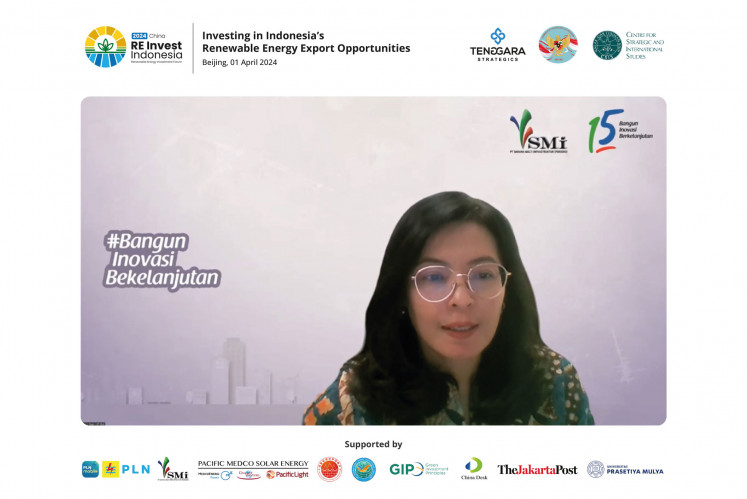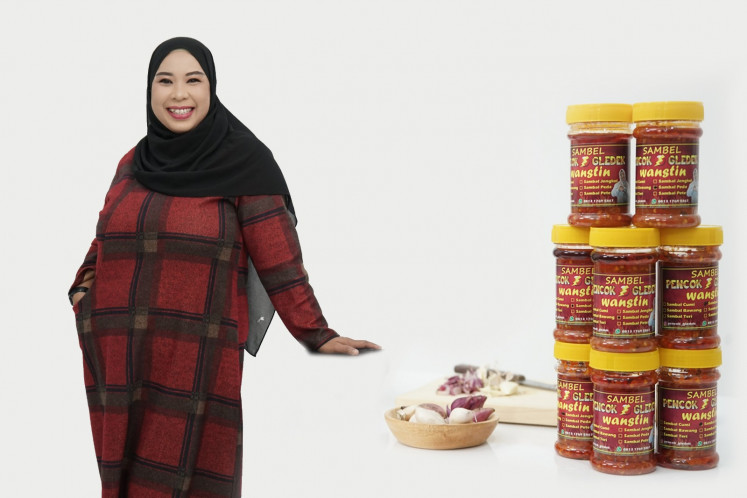Kalla calls on businesses to boost sharia economy
Change Size
 Vice President Jusuf Kalla (center), along with (from left to right) East Java Governor Soekarwo, National Development Planning Minister and National Development Planning Board (Bappenas) head Bambang Brodjonegoro, Bank Indonesia Governor Agus Martowardojo, Religious Affairs Minister Lukman Hakim Saifuddin, Financial Services Authority (OJK) commissioner board chief Wimboh Santoso and Deposit Insurance Corporation (LPS) chief Halim Alamsyah pose for a photograph after opening the fourth Indonesia Shari’a Economic Festival 2017 in Surabaya, East Java, on Nov.9. (JP/Arief Suhardiman)
Vice President Jusuf Kalla (center), along with (from left to right) East Java Governor Soekarwo, National Development Planning Minister and National Development Planning Board (Bappenas) head Bambang Brodjonegoro, Bank Indonesia Governor Agus Martowardojo, Religious Affairs Minister Lukman Hakim Saifuddin, Financial Services Authority (OJK) commissioner board chief Wimboh Santoso and Deposit Insurance Corporation (LPS) chief Halim Alamsyah pose for a photograph after opening the fourth Indonesia Shari’a Economic Festival 2017 in Surabaya, East Java, on Nov.9. (JP/Arief Suhardiman)
V
ice-President Jusuf Kalla has said that it is important for all discussions on sharia economy and finance to spur concrete actions, particularly by bidding business players, in order for Indonesia to close the gap between itself and other countries.
“What we must do first is to get started in business. I often say that one of Indonesia’s weaknesses is the weakness in the field of economy,” he said while opening the fourth Indonesia Sharia Economic Festival (ISEF) held by Bank Indonesia (BI) in Surabaya on Thursday.
Kalla added that Muslims, in particular, should have a greater interest in business as the Prophet Muhammad himself was a successful trader and Muslims are encouraged to follow his path.
“The prophet taught us that nine out of 10 sources of sustenance is from trade. We know that the prophet was a trader. So, trade is also a sunnah [teaching] of the prophet,” he said in front of a crowd of around 1,200 people, including government officials, entrepreneurs and students and teachers from 80 pesantren (Islamic boarding school).
Kalla urged pesantren teachers to not only teach about business, but also help students start their own businesses. He also dismissed the notion that the halal or sharia industry was complicated and limited, arguing that the opportunities and options offered by the halal industry are plentiful.
“In regards to halal, it is very simple. As long as it is not haram [forbidden by Islamic law], as long as it doesn’t involve gambling, as long as it doesn’t involve speculation, then it is halal. And all that is halal is sharia,” he said.
In his opening address, Bank Indonesia governor Agus DW Martowardojo highlighted the competition in the global halal industry, which has attracted many countries due to a huge market and increasing demand for halal products.
“The global halal industry reached US$ 3.8 trillion in 2015 and is projected to grow to $ 6.38 trillion in 2021. This promising growth has prompted various countries to become main players in the global halal industry,” he said.
He added that this phenomenon was not restricted to Muslim-majority countries, but also in countries like England, China and Thailand. As the country with the world’s biggest Muslim population, Indonesia should have a bigger opportunity to develop its halal industry and become a leading player in the global halal market.
However, this opportunity has not been seized by Indonesia, he added.
Agus expressed his hope that the establishment of the Sharia Finance National Committee (KNKS) in July would boost Indonesia’s sharia economy and provide effective and comprehensive strategies.
“We hope that [the KNKS] can synergize policies and programs related to the development of sharia economy and finance, and from various authorities and other institutions,” he said.
The four ISEF, which was held under the theme “Fostering Inclusive Economic Growth and Improving Resiliency through Closer Collaboration and Coordination,” featured not only seminars, workshops and meeting, but also a sharia economic fair in which small and medium enterprises, as well as financial service companies are given booths to showcase and promote their products.









